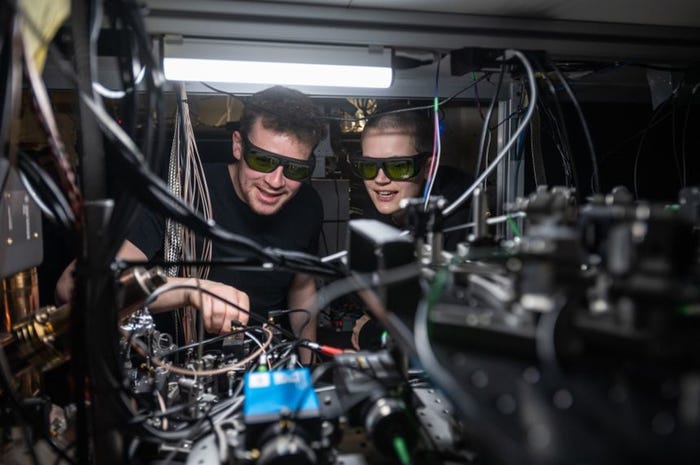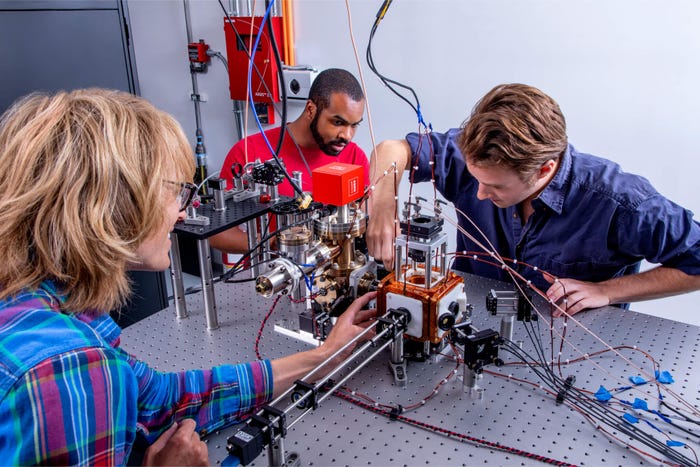
Connects decision-makers and solutions creators to what's next in quantum computing
How U.S. National Quantum Initiative Aims to Shape Quantum ComputingHow U.S. National Quantum Initiative Aims to Shape Quantum Computing
Q&A with Atom Computing CEO Rob Hays

The U.S. Government released the National Quantum Initiative (NQI) supplement to the President’s FY 2024 budget in December. It recommends substantial and sustained investment in quantum research and development and, if approved, will have significant implications for scientific, economic and national security priorities and quantum technology over the next five years.
Rob Hays, CEO of Atom Computing, is a strong advocate of the critical need for the U.S. and its allies to win the quantum race, particularly given China's determined efforts to lead in this transformative technology. Atom Computing’s platform last year became the first to cross the 1,000-qubit threshold for a universal gate-based system.
Here Hays talks about the importance of NQI, the importance of supporting a diversity of quantum platforms and the race to scale to practical commercial quantum computing.
Enter Quantum: Why are you so passionate about NQI?
Rob Hays: Atom Computing is an industry participant, and we are very eager to see the U.S. renew NQI. We are specifically advocating for expanding both the scope and dollars that are coming in from the U.S. Government to compete better against foreign adversaries and other international competitors.
We also believe NQI should drive some diversity of the quantum technology the U.S. is investing in to try to improve our chances of success. It should have more of a portfolio approach versus a very targeted approach on a narrower set of technologies given that it's very early in the quantum computing and quantum technology sort of race. The winners aren't certain and it's hard to pick winners early.
Tell me about Atom Computing’s platform.
We’re building our computers out of large arrays of atomic or neutral atoms. We use alkaline earth elements from the second column of the periodic table and trap these neutral atoms in free space in a vacuum with lasers. Then we can arrange them into a grid or any arbitrary arrangement that we want to create entanglement or other things like that using Rydberg states. We manipulate their quantum states using different pulses of light.
It's different from superconducting or trapped ions, which are the more mature technologies that build chips or traps. They can only fit so many qubits on a given chip at a given point in time. Given that we're doing this in free space with just spots of light, we can scale up much more quickly and efficiently than the other modalities.
Scaling is one of the important performance metrics of a quantum computer. You need a lot of physical qubits to put error correction codes on top of it and get fault-tolerant logical qubits.
One of your partners is the telecommunications company Vodafone. What work are you doing with them?
Vodafone was an early partner for us. So far, we've helped them craft some algorithms for some of the use cases that they're looking at. We can’t share details of their use cases, but they are related to the extensive networks they have in Europe, and their optimization problems. We've been helping them modify and run those algorithms, initially on emulators and then and then eventually on a hardware platform.
Will quantum computing always need a variety of platforms for different applications?
We’re going to see a variety of different problems. The industry has a consensus on optimization problems, whether that’s large networks, transportation, logistics or portfolio optimization.
Then there are simulation problems, specifically simulation of real-world physical things based on chemistry and physics. Those kinds of simulations can apply to any number of use cases around energy, pharmaceuticals, fertilizers, material science, all those kinds of things.
Cryptography probably gets more than its fair share of news. The fourth is enhancements to machine learning and artificial intelligence.
Those are the four broad four categories and they touch lots of different industries. I'd say the stage that application researchers are in right now is trying to take some of the algorithms from academia, figure out which ones map to their use cases, and then figure out how they can map their problem set to the algorithm and then and then the algorithm to an actual quantum circuit. Then maybe they can run a small version of that circuit today on existing quantum hardware or simulators to get some experience and validate on a small scale that will work for them. The results could be applied on a larger scale on future systems.
How should initiatives like NQI balance the quantum risk with the potential reward?
Quantum decryption is a very real threat. But it's going to take a long time for quantum systems to get to the scale where that's going to be feasible. In the meantime, everyone's working towards new encryption standards that are quantum resilient.
I'm hoping it will be like Y2K and it'll be much ado about nothing by the time we get there. By the time we get to the point where a quantum computer can decrypt today's encrypted data, it will have already been re-encrypted in something else and at least the new data will be secure.
In the meantime, we're focused on some of these fault-tolerant applications in the future around chemistry simulation and, in the near term, more optimization problems and machine learning. I don't think we're alone in that, the industry at large is looking to provide value.
What’s next for national and international initiatives like the NQI?
For the U.S. and our allied countries like the UK, I think that the National Quantum Initiative Act is something that we need to do. Driving more diversity and a larger scope is the right thing to do to ensure that, jointly, we have success.
Additionally, some of the collaboration agreements that the U.K., the U.S. and other allied nations have signed are helping transfer technology across borders, which helps us all. Like-minded nations compete but also make sure that we have economic success in this next wave of quantum computing as well as national defense and security.
About the Author
You May Also Like






